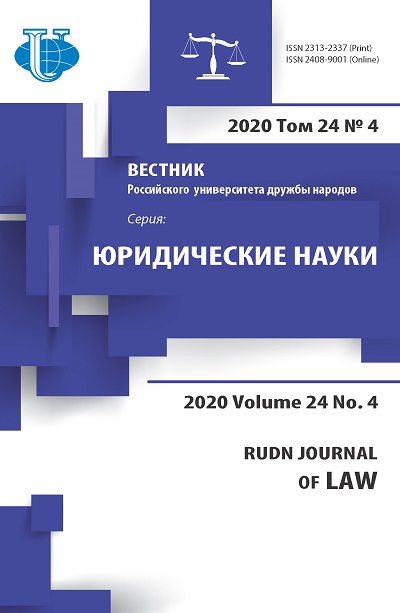MINI-PARLIAMENTS IN THE POST-DICTATORSHIP DEMOCRACIES OF WESTERN EUROPE AND LATIN AMERICA
- Authors: Koshel A.S.1
-
Affiliations:
- Far-Eastern Federal University
- Issue: Vol 24, No 4 (2020)
- Pages: 942-964
- Section: HISTORICAL AND LEGAL RESEARC
- URL: https://journals.rudn.ru/law/article/view/25247
- DOI: https://doi.org/10.22363/2313-2337-2020-24-4-942-964
Cite item
Full Text
Abstract
The article investigtes the powers and parliamentary procedures in the standing committees and commissions of several countries of Western Europe and Latin America. The author believes that one of the modern paradigms for the development of parliamentary democracy is to strengthen the role of standing committees in the work of parliament by transferring to the committee level a number of constitutional powers of parliaments. In this regard, the author clarifies approaches to the classification of the committee structure of parliaments and looks at committee parliamentary procedures in Italy, Germany, Greece, Portugal, Spain, Brazil and Argentina at the present stage. The author comes to certain conclusions regarding the paradigm of the committee parliamentary procedure, including further improvement of domestic constitutional-legal matter in the context of the ongoing development of parliamentary democracy in the Russian Federation.
About the authors
Alexey S. Koshel
Far-Eastern Federal University
Author for correspondence.
Email: koshel.as@dvfu.ru
Candidate of Political Science, Associate Professor, Vice-Rector, Associate Professor of the Constitutional and Administrative Law Department
10 Ajaks, Russkiy Island, Vladivostok, 690922, Russian FederationReferences
- Alekseev, S.S. (2010) Sobranie sochinenii. V 10 t. T. 5 [Collected works. In 10 vols. T. 5]. Moscow, Statut Publ. (in Russian).
- Bonvecchi, A., Cherny, N., Cella, L. (2018) Modernizar el Congreso. Propuestas para el Reglamento de la Cámara de Diputados. Documento de Políticas Públicas. Recomendación No 200. Buenos Aires: CIPPEC. (in Spanish).
- Canotilho, G., Moreira, V. (2010) Constituição da República Portuguesa anotada. Vol. II. Lisboa. (in Portuguese).
- Chirkin, V.E. (2014) On Accuracy of the Terminology on Adoption of Law. Journal of Russian Law. 4 (208), 29–33. doi: 10.12737/2916. (in Russian).
- Chirkin, V.E. (2002) Puti razvitiya sovremennogo parlamenta: «mini-parlamenty» [Ways of development of the modern parliament: “mini-parliaments”]. Izvestiya vysshih uchebnyh zavedenii. Pravovedenie. 2 (241), 24–33. (in Russian).
- D'Orta, C. (1982) Il nuovo procedimento legislativo in sede redigente: un regime transitorio? Parlamento. 28, 31–34. (in Italian).
- Della Sala, V. (1993) The Permanent Committees of the Italian chamber of deputies: Parliament at work? Legislative Studies Quarterly. 18(2), 157–183.
- Feierherd, G. (2007) El control de la agenda legislativa en Argentina. Instituto de investigaciones Gino Germani, available at: https://webiigg.sociales.uba.ar/historiapolitica/seminario% 20invetigacion/control_german.pdf. (Accessed 04 May 2020). (in Spanish).
- Fernandes, J.M, Riera, P., Cantú, F. (2019) The politics of committee chairs assignment in Ireland and Spain. Parliamentary Affairs. 72(1), 182–201.
- Gilligan, T.W., Krehbiel, K. (1990) Organization of informative committees by a rational legislature. American Journal of Political Science. (34), 531–564.
- Gorobets, V.D. (1998) Sistema komitetov i komissiĭ palat Federal'nogo Sobraniya [The system of committees and commissions of the chambers of the Federal Assembly]. Gosudarstvo i pravo. (8), 33–38. (in Russian).
- Gorobets, V.D. (2000) Konstitucionno-pravovoi status Parlamenta Rossiiskoi Federacii [Constitutional and legal status of the Parliament of the Russian Federation]. Author. dis. ... of doctor of legal sciences. Moscow. (in Russian).
- Gryzlov, B.V. (2009) Spetsializirovannye organy parlamenta: sravnitel'nyi analiz [Specialized bodies of parliament: a comparative analysis]. POLITEX. 5(1), 26–36. (in Russian).
- Kaeding, M. (2005) The world of committee reports: rapporteurship assignment in the European Parliament. The Journal of Legislative Studies. 11(1), 82–104.
- Korris, M. (2011) Standing up for scrutiny: How and why Parliament should make better law. Parliamentary Affairs. 64(3), 564–574.
- Lazareva, M.N. (2008) Parliamentary Procedures in Czech Republic and the Russian Federation. Journal of Russian Law. 11(143), 105–111. (in Russian).
- Luna, M.A., Pérez Nieves, J.C. (2009) País Análisis coordinado del reglamento de la Cámara de Senadores de la Nación. Revista de Derecho Parlamentario. 8, available at: https://ar.ijeditores. com/articulos.php?idarticulo=66034&print=2 (Accessed: 03 May 2020). (in Spanish).
- Montesquieu, C.-L. de, Sh.L. (1999) O duhe zakonov [About the spirit of laws]. Moscow, Mysl' Publ. (in Russian).
- Norton, P. (1998) Nascent institutionalisation: Committees in the British parliament. The Journal of Legislative Studies. 4(1), 143–162.
- Paniagua Soto, J.L. (1997) Spain: A Fledgling Parliament 1977–1997. Parliamentary Affairs. 50(3), 410–422.
- Senigaglia, C. (2011) Max Weber and the parliamentary bureaucracy of his time. Parliaments, Estates and Representation. 31(1), 53–66.
- Shepsle, K.A., Weingast, B.R. (1994) Positive Theories of Congressional Institutions. Legislative Studies Quarterly. (19), 149–179.
- Strashun, B.A. (ed.) (2012) Konstitutsionnoe (gosudarstvennoe) pravo zarubezhnykh stran. [Constitutional (state) law of foreign countries]. Uchebnik dlya bakalavrov. Otvetstvennyi redaktor doktor yuridicheskikh nauk, professor, zasluzhennyi deyatel' nauki RF B.A. Strashun [A textbook for bachelors. Strashun B.A. Executive editor Doctor of Law, Professor, Honored Scientist of the Russian Federation]. Moscow. Prospekt Publ. (in Russian).
- Tchintian, C., Goyburu, L. Cella, L. (2019) Reglamentos comparados de Cámaras de Diputados de América del Sur. Documento de Trabajo № 18. Buenos Aires: CIPPEC, available at: https://cippec.org/wp-content/uploads/2019/02/ 177-DT-IP-Reglamentos-comparados-decamaras-de-diputados-Tchintian-Goyuburu-y-Cella-febrero-2019-1.pdf. (Accessed 06 May 2020). (in Portuguese).
- Torop, Yu.V. (2006) Rol' parlamentskih komitetov v zakonodatel'nom processe (na primere federativnyh gosudarstv Zapadnoi Evropy) [The role of parliamentary committees in the legislative process (on the example of the federal states of Western Europe)]. Izvestiya vysshih uchebnyh zavedenii. Pravovedenie. 6(269), 29–35. (in Russian).
- Van der Meer, T. (2010) In what we trust? A multi-level study into trust in parliament as an evaluation of state characteristics. International Review of Administrative Sciences. 76(3), 517–536.
- Weir, S., Kearton, I. (2002) Parliamentary committees abroad, their functions and powers: memorandum from democratic audit, human rights centre, university of Essex. Essex, 2002, available at: https://publications.parliament.uk/pa/cm200102/cmselect/cmmodern/224/224ap25.htm (Accessed 06 May 2020).
- Zhukov, V.N. (2017) Mechanisms of increasing the effectiveness of the multi-party institution in the context of electoral reform. Сentral Russian journal of social sciences. 12 (6), 164– 170. doi: 10.22394/2071-2367-2017-12-6-164-170. (in Russian).
















